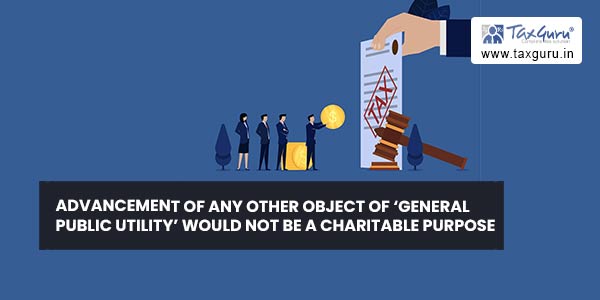It is our impression that Sections applicable to Charitable Trusts are 11,12 and 13 Section 10(23C) and 80G of the Income Tax Act, 1961. It is important to note that which kind of purpose are considered as Charitable Purpose? Section 2(15) of the Act charitable purpose has been define as under:
“ Charitable Purpose” includes:
Relief of the poor,
Education,
Yoga,
Medical Relief,
Preservation of environment (including watersheds, forest and wild life),
Preservation of monuments or places or objects of artistic or historic interest, and
The advancement of any other object of general public utility:
Provided that the advancement of any other object of general public utility shall not be a charitable purpose, if it involves the carrying on of any activity in the nature of trade, commerce or business, or any activity of rendering any service in relation to any trade, commerce or business, for a cess or fee or any other consideration, irrespective of the nature of use or application, or retention, of the income from such activity, unless-
- Such activity is undertaken in the course of actual carrying out of such advancement of any other object of general public utility; and
- The aggregate receipt from such activity or activities during the previous year, do not exceed twenty percent of the total receipts, of the trust or institution undertaking such activity or activities, of that previous year.
- From the above definition, the question arises as to what is an object of “general public activity” This expression has not been defined anywhere in the Act.

The Supreme Court has observed in the of CIT vs. Gujarat Maritimes Board (2007) 295 ITR 561 that the Gujarat Maritime Board was established for the predominate purpose of development of minor ports within the State of Gujarat and there was no profit motive. The Assessee, Gujarat Maritime Board, was under a legal obligation to apply its income which was directly and substantially from the business held under trust for the development of minor ports in Gujarat. Therefore Supreme Court held that the asessee was entitled to be registered as “charitable trust” under section 12A of the Act.
Therefore, in effect, “advancement of any other object of general public utility” would continue to be a “charitable purpose”, if the activity in the nature of trade, commerce, or business is undertaken in the course of actual carrying out of such advancement of any other object of general public utility and the aggregate receipts from any activity in the nature of trade, commerce or business, or any activity of rendering service in relation to any trade, commerce or business does not exceed 20% of the total receipts of the trust or institution undertaking such activities, for the previous year.
To understand it takes an example:
An institution having its main object as “advancement of general public utility” received Rs. 40 lakhs in aggregate during the previous year 2021-22 from an activity in the nature of trade. The total receipts of the institution, including donation was Rs.190 lakhs. It applied 85% of its total receipts from such receipts from such activity during the same year for its main object i.e. advancement of general public utility.
1. What would be the tax consequence of such receipt and application thereof by the institution?
2. Would your answer be different if the institution’s total receipts had been Rs. 200 lakhs in aggregate?
3. What would be your answer if the main object of the institution is “relief to the poor” and the institution received Rs. 40 lakhs from trading activity, when its total receipts are Rs. 190 lakhs and applied 85% of he said receipts for its main object?
Answer:
01. As the main object of the institution is “ advancement of general public utility” the institution will lose its “ charitable “ status, since it has received Rs. 40 lakhs from an activity in the nature of trade , commerce or business which exceed Rs.38 lakhs, being 20% of total receipts. The application of 85% of such receipt for its main object during the year would not help in retaining its “ charitable” status.
02. If the institution’s total receipts is Rs.200 lakhs, and the institution received Rs. 40 lakhs in aggregate from an activity in the nature of trade, commerce and business, then it will not loose its “charitable “ status since the receipt of up to 20% of total receipts of the institutions. The institutions can claim exemption subject to fulfillment of other conditions under sections 11 to 13.
03. The restriction regarding carrying on a trading activity for a cess, fee or other consideration will not apply if main object of the institution is “relief of the poor”. Therefore, receipts of Rs. 40lakhs from a trading activity will not affect its “charitable “ status, even if it exceeds 20% of the total receipts of the institution.
From the above definition, the question arises as to what is an object of “general public activity” This expression has not been defined anywhere in the Act.





